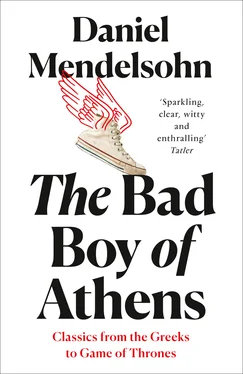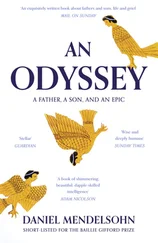The first, ‘tragic’ half of the short drama begins with a sombre expository prologue by Apollo, followed by a debate between Apollo and Death, who has come to claim Alcestis and who is warned that he won’t, in the end, get his way. We are then plunged into the mortal world and a mood of unrelenting gloom: a heartrending scene of Alcestis’s slow death; her farewells to her children (whom she relinquishes to her husband on the condition that he not neglect them) and to her husband (who vows never to remarry); her impassioned outburst, addressed to her marriage bed, as she sees death approaching; her funeral procession, which is interrupted by a violent argument between Admetos and his aged father, Pheres (who along with his elderly wife refused to die in his son’s place when given the chance to do so); and a grief-stricken Admetos’s return to his empty house after the funeral.
The second, ‘comic’, half presents the spectacle of the rambunctious Herakles’ arrival at the house of mourning (he is en route to yet another of his Labours); Admetos’s excruciatingly diplomatic efforts to keep up his reputation as a good friend and legendary host (he doesn’t want Herakles to know Alcestis has died lest his guest feel unwelcome); a drunken, feasting Herakles’ discovery of the truth, and his subsequent vow to bring his friend’s wife back; and the hero’s rescue of Alcestis after a wrestling match with Death himself, which takes place beside Alcestis’s tomb. The play ends with the eerie spectacle of a triumphant Herakles, like the father of a bride, handing over the veiled and silent figure of Alcestis to Admetos without, at first, telling Admetos who the woman is – teasing him in order to prolong the suspense. She never speaks again during the course of the play.
The hodgepodge of moods, styles, and themes suggested by even this cursory summary has made interpretation of this strange work particularly thorny. To cite John Wilson further:
Even the genre to which the play belongs is disputed – is it a tragedy, a satyr play, or the first example of a tragicomedy? Who is the main character, Alcestis or Admetos? And through whose eyes are we to see this wife and this husband? Is Alcestis as noble as she says she is? And is Admetos worthy of her devotion, or does he deserve all the blame that his father, Pheres, heaps upon him? And is the salvation of Alcestis a true mystery, a sardonic ‘and so they lived happily ever after’, or simply the convenient end of an entertainment?
These questions continue to puzzle classicists, despite radical shifts in the way we read classical texts. Since Wilson wrote in the 1960s, no literary-critical school has influenced classical scholarship so much as feminist studies has; and the Alcestis has proved an especially rich vehicle for scholars interested in demonstrating the extent to which literary production in classical Greece reflected the patriarchal bias of Athenian society during its cultural heyday. ‘The genre of the Alcestis ,’ the classicist Nancy Sorkin Rabinowitz has written in a stimulating if perhaps too ideologically rigid study of Euripides’ handling of female characters, ‘… depends on gender. On the surface, it is comic: death leads to life, and a funeral resolves into a wedding. But is it a happy ending for Alcestis as well as for Admetos? Although funeral and wedding may seem to be opposites, they come to much the same thing for this woman.’
You don’t have to be a feminist hardliner to have your doubts about Admetos. Even at the very beginning of the drama, as Alcestis lies dying within the house, the king’s self-involvement takes your breath away. It is true that the laments he utters in his exchange with the dying Alcestis are all fairly conventional (‘Don’t forsake me,’ ‘I am nothing without you’), and yet their cumulative effect is unsettling: gradually, it strikes you that for Admetos this domestic disaster is all about him. Alcestis’s death, he cries, is ‘heavier than any death of my own’ – an appeal for sympathy that’s a bit much, considering that she’s dying precisely because he was afraid to. He’s Periclean Athens’s answer to the guy in the joke about the classic definition of chutzpah – the one who murders his parents and then throws himself on the mercy of the court because he’s an orphan.
Admetos makes the dying Alcestis several somewhat excessive promises: among them, a vow to ban all revelry for a full year, and an oath never to take another woman into his house. Yet by the end of the play he will have broken both: first when he allows Herakles to be feted with wine and music, and then when he accepts, as a man might accept a new bride, the anonymous veiled woman into his household – before he knows she’s Alcestis. Most bizarrely, he declares that he will have an artisan fashion a statue of Alcestis, which he will take to bed and caress as if it were she – a ‘cold pleasure’, to be sure, but one that will help to assuage his loss. For some critics, this has a fetishistic, doth-protest-too-much quality; whatever you make of it, it’s striking that, having promised to mourn Alcestis forever, her husband begins, before she even dies, to seek comfort (however cold) for himself.
So the husband is a weak man in the first part of the play. But he must be so, since whatever ‘tragic’ – or, for that matter, dramatic – development Euripides’ play has depends on Admetos’s evolution – on his starting out as a less than admirable man who comes to realize that the existence he has purchased with his wife’s life isn’t worth having precisely because he has lost her. ‘Now I understand,’ he exclaims at the play’s climax, right before Herakles enters with the resurrected Alcestis. Even so, this king is no hero: Alcestis’s miraculous return from the grave yanks her husband back from the brink of truly tragic self-knowledge, the kind he’d have acquired if he had had to live with his loss, as characters in ‘real’ tragedies do. (When they don’t kill themselves, that is.)
As it is, Admetos gets to eat his cake and have it, too. ‘Many readers will feel [his grief] does not change him enough,’ the Harvard classicist Charles Segal tartly observed in one of several penetrating essays he wrote on this play. Richmond Lattimore, who translated the Alcestis for the University of Chicago Greek Drama series nearly half a century ago, was moved, similarly, to question Admetos’s character, using the bemused rhetorical-question mode into which those who have grappled with the Alcestis keep falling, no doubt because the work’s violent wobbling between genres makes any definitive pronouncement seem foolhardy. ‘If a husband lets his wife die for him,’ Lattimore asked, ‘what manner of man must that husband be?’
Hughes’s Alcestis adaptation invites us to believe that this is, in fact, the wrong question to be asking. His version is wholly unconcerned with Admetos’s flaws, not least because in his version, Admetos has no flaws. Everything in Euripides that suggests we ought to question the husband’s character has here been excised; instead, it’s God who gets the rough treatment. It’s a striking alteration.
The clean-up job begins early on. In Euripides’ play we learn that Apollo, in gratitude for being well treated chez Admetos, has promised the mortal king that he will be able to avoid his death if he can find someone to die in his place; Admetos tries all his loved ones in turn until finally his wife agrees to die for him. But in Hughes’s version, Admetos is spared the embarrassing (indeed, damning) task of begging his relatives – and wife – for volunteers; here, it’s Apollo who ‘canvasses’ for substitutes. In fact, Apollo doesn’t even have to ask Alcestis, as in Euripides’ play Admetos most certainly does: she just volunteers. (It’s interesting that Hughes’s heroine is more faithful to her counterpart in the Greek original than his Admetos is to his; and when he gives her lines that Euripides didn’t – as when, in her farewell to her daughter, she pathetically exclaims, ‘She will not even know what I looked like’ – the drama is enhanced.)
Читать дальше












